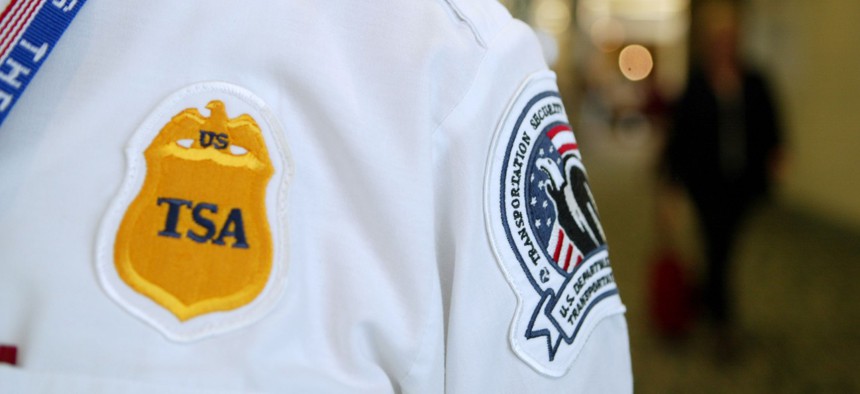
Pay and a lack of full union rights are contributing to low morale among TSA workers. Joe Raedle/Getty Images
TSA Screeners Could Be in Line for 30% Pay Raises on Average
A bipartisan measure passed by the House would move the Transportation Security Administration’s workforce under Title 5, which also promises full collective bargaining rights and other civil service protections enjoyed by most federal employees.
The House last week voted 220-201 to pass a bill that would provide Transportation Security Administration employees with the pay, benefits and due process protections already afforded to the vast majority of the federal workforce.
Since TSA was established following the September 11, 2001, terrorist attacks, employees at the agency have been part of a siloed personnel system, where they do not receive regular raises like most other federal workers and lack due process and whistleblower protections. They have abridged collective bargaining rights as well.
As a result, the agency suffers from consistently low morale and retention; according to the 2020 Federal Employee Viewpoint Survey, TSA ranked last at 407th place among agency subcomponents in terms of pay satisfaction. Entry level screener salaries start at an average of $35,000 per year and can be as low as $29,000 annually, figures much lower than their counterparts elsewhere in government.
The Rights of the TSA Workforce Act (H.R. 903), introduced by Rep. Bennie Thompson, D-Miss., would apply Title 5 of the U.S. Code to the TSA workforce, bringing employees onto the General Schedule pay scale and granting them access to the rest of the federal government’s whistleblower and due process protections, as well as full federal sector collective bargaining rights. The bill has 14 Republican cosponsors, although only four Republicans ultimately voted in favor of the bill's passage.
The Biden administration is in the midst of an effort to grant TSA employees many of these protections administratively, as well as to adopt a new pay system akin to the General Schedule, although Congress must appropriate an additional $1.6 billion compared to the 2021 enacted funding level in fiscal 2023 to accommodate the move.
On the House floor, Thompson said that his bill would provide the TSA screener workforce with an average pay raise of 30%, while federal air marshals would receive a 21% raise, placing both occupations’ salaries in line with other Homeland Security Department agencies, like U.S. Customs and Border Protection.
“The most recent analysis done on turnover shows that over a two-year span, one in three transportation security officers quit,” he said. “It also revealed that in a single year, TSA spent $16 million to hire and onboard nearly 2,000 people, who left just months after they got the job. This revolving door of recruiting, training and then losing TSOs is unsustainable and underscores the need to find a permanent solution that will ensure TSA lives up to its critical national security mission.”
But some Republicans opposed the bill, arguing that while they support granting airport screeners pay raises in theory, the bill would also benefit “bureaucrats” and union bosses. They also claimed that granting full collective bargaining rights to TSA employees would prevent the agency from quickly rolling out new procedures needed for national security, an assertion that TSA denies.
Republicans previously attempted, unsuccessfully, to amend the bill by replacing its text with a plan to provide TSA screeners with a $3,000 immediate pay increase, followed by a series of annual raises that collectively amount to a 16% pay raise.
“It’s clear that all Republicans support increasing the pay of TSA workers, but this bill doesn’t deal specifically with that,” said Rep. Michael Guest, R-Miss. “If that was the case, during committee markup, [Republicans’] amendment would have been adopted. This bill today is not just to increase pay, but this is a labor bill. It’s an attempt to unionize an entire federal agency. We shouldn’t be putting labor leaders on committees that protect the traveling public.”
The TSA frontline workforce is already unionized, through the American Federation of Government Employees. If this legislation were to become law, that bargaining unit would remain, as would the fact that managers at the agency are ineligible to organize.
Rep. Lou Correa, D-Calif., called the idea that public safety and national security missions could be endangered by the presence of collective bargaining a “red herring.”
“What’s wrong with unions?” he said. “Our Border Patrol officers are unionized, local police officers are unionized, local sheriffs are unionized, and countless other public safety officers are unionized . . . Law enforcement agencies across the federal and local governments have benefited from collective bargaining representation without any harm to national security.”
With the bill’s passage, it now goes to the Senate for consideration.







